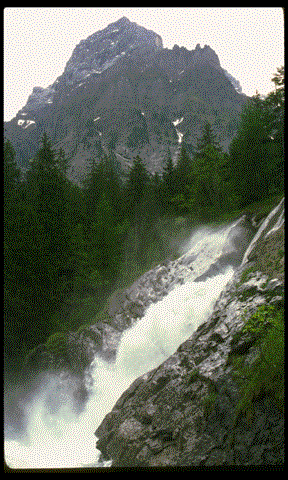It was under circumstances of difficulty
and discouragement that Isaiah, while yet a young man, was called
to the prophetic mission. Disaster was threatening his country.
By their transgression of God's law the people of Judah had forfeited
His protection, and the Assyrian forces were about to come against
the kingdom of Judah. But the danger from their enemies was not
the greatest trouble. It was the perversity of the people that
brought upon the Lord's servant the deepest depression. By their
apostasy and rebellion they were inviting the judgments of God.
The youthful prophet had been called
to bear to them a message of warning, and he knew that he would
meet with obstinate resistance. He trembled as he viewed himself
and thought of the stubbornness and unbelief of the people for
whom he was to labor. His task seemed to him almost hopeless.
Should he in despair relinquish his mission and leave Israel
undisturbed to their idolatry? Were the gods of Nineveh to rule
the earth in defiance of the God of heaven?
Such thoughts as these were crowding upon his mind as he stood under the portico of the holy temple. Suddenly the gate and the inner veil of the temple seemed to be uplifted or withdrawn, and he was permitted to gaze within, upon the holy of holies, where even the prophet's feet might not enter. There rose up before him a vision of Jehovah sitting upon a throne high and lifted up, while His train filled the temple. On each side the throne hovered the seraphim, two wings bearing them up, two veiling their faces in adoration, and two covering their feet. These angel ministers lifted up their voices in solemn invocation, "Holy, holy, holy, is the Lord of hosts: the whole earth is full of His glory," until post and pillar and cedar gate seemed to tremble at the sound, and the house was filled with their praise.
Never before had Isaiah realized so fully
the greatness of Jehovah or His perfect holiness; and he felt
that in his human frailty and unworthiness he must perish in
that divine presence. "Woe is me!" he cried; "for
I am undone; because I am a man of unclean lips, and I dwell
in the midst of a people of unclean lips: for mine eyes have
seen the King, the Lord of hosts." But a seraph came to
him to fit him for his great mission. A living coal from the
altar was laid upon his lips with the words: "Lo, this hath
touched thy lips; and thine iniquity is taken away, and thy sin
purged." And when the voice of God was heard saying, "Whom
shall I send, and who will go for us?" Isaiah with holy
confidence responded, "Here am I; send me."
What though earthly powers should be arrayed
against Judah? What though Isaiah should meet with opposition
and resistance in his mission? He had seen the King, the Lord
of hosts; he had heard the song of the seraphim, "The whole
earth is full of His glory;" and the prophet was nerved
for the work before him. The memory of this vision was carried
with him throughout his long and arduous mission.
Ezekiel, the mourning exile prophet, in
the land of the Chaldeans, was given a vision teaching the same
lesson of faith in the mighty God of Israel. As he was upon the
banks of the river Chebar, a whirlwind seemed to come from the
north, "a great cloud, and a fire infolding itself, and
a brightness was about it, and out of the midst thereof as the
color of amber." A number of wheels of strange appearance,
intersecting one another, were moved by four living creatures.
High above all these was "the likeness of a throne, as the
appearance of a sapphire stone: and upon the likeness of the
throne was the likeness as the appearance of a man above upon
it." "As for the likeness of the living creatures,
their appearance was like burning coals of fire, and like the
appearance of lamps: it went up and down among the living creatures;
and the fire was bright, and out of the fire went forth lightning."
"And there appeared in the cherubims the form of a man's
hand under their wings."

There were wheels within wheels in an arrangement
so complicated that at first sight they appeared to Ezekiel to
be all in confusion. But when they moved, it was with beautiful
exactness and in perfect harmony. Heavenly beings were impelling
these wheels, and, above all, upon the glorious sapphire throne,
was the Eternal One; while round about the throne was the encircling
rainbow, emblem of grace and love. Overpowered by the terrible
glory of the scene, Ezekiel fell upon his face, when a voice
bade him arise and hear the word of the Lord. Then there was
given him a message of warning for Israel.
This vision was given to Ezekiel at a time
when his mind was filled with gloomy forebodings. He saw the
land of his fathers lying desolate. The city that was once full
of people was no longer inhabited. The voice of mirth and the
song of praise were no more heard within her walls. The prophet
himself was a stranger in a strange land, where boundless ambition
and savage cruelty reigned supreme. That which he saw and heard
of human tyranny and wrong distressed his soul, and he mourned
bitterly day and night. But the wonderful symbols presented before
him beside the river Chebar revealed an overruling power mightier
than that of earthly rulers. Above the proud and cruel monarchs
of Assyria and Babylon the God of mercy and truth was enthroned.
The wheellike complications that appeared
to the prophet to be involved in such confusion were under the
guidance of an infinite hand. The Spirit of God, revealed to
him as moving and directing these wheels, brought harmony out
of confusion; so the whole world was under His control. Myriads
of glorified beings were ready at His word to overrule the power
and policy of evil men, and bring good to His faithful ones.
In like manner, when God was about to open
to the beloved John the history of the church for future ages,
He gave him an assurance of the Saviour's interest and care for
His people by revealing to him "One like unto the Son of
man," walking among the candlesticks, which symbolized the
seven churches. While John was shown the last great struggles
of the church with earthly powers, he was also permitted to behold
the final victory and deliverance of the faithful. He saw the
church brought into deadly conflict with the beast and his image,
and the worship of that beast enforced on pain of death. But
looking beyond the smoke and din of the battle, he beheld a company
upon Mount Zion with the Lamb, having, instead of the mark of
the beast, the "Father's name written in their foreheads."
And again he saw "them that had gotten the victory over
the beast, and over his image, and over
his mark, and over the number of his name, stand on the sea of
glass, having the harps of God" and singing the song of
Moses and the Lamb.

These lessons are for our benefit. We need
to stay our faith upon God, for there is just before us a time
that will try men's souls. Christ, upon the Mount of Olives,
rehearsed the fearful judgments that were to precede His second
coming: "Ye shall hear of wars and rumors of wars."
"Nation shall rise against nation, and kingdom against kingdom:
and there shall be famines, and pestilences, and earthquakes,
in divers places. All these are the beginning of sorrows."
While these prophecies received a partial fulfillment at the
destruction of Jerusalem, they have a more direct application
to the last days.
We are standing on the threshold of great
and solemn events. Prophecy is fast fulfilling. The Lord is at
the door. There is soon to open before us a period of overwhelming
interest to all living. The controversies of the past are to
be revived; new controversies will arise. The scenes to be enacted
in our world are not yet even dreamed of. Satan is at work through
human agencies. Those who are making an effort to change the
Constitution and secure a law enforcing Sunday observance little
realize what will be the result. A crisis is just upon us.
But God's servants are not to trust to
themselves in this great emergency. In the visions given to Isaiah,
to Ezekiel, and to John we see how closely heaven is connected
with the events taking place upon the earth and how great is
the care of God for those who are loyal to Him. The world is
not without a ruler. The program of coming events is in the hands
of the Lord. The Majesty of heaven has the destiny of nations,
as well as the concerns of His church, in His own charge.
We permit ourselves to feel altogether
too much care, trouble, and perplexity in the Lord's work. Finite
men are not left to carry the burden of responsibility. We need
to trust in God, believe in Him,
and go forward. The tireless vigilance of the heavenly messengers,
and their unceasing employment in their ministry in connection
with the beings of earth, show us how God's hand is guiding the
wheel within a wheel. The divine Instructor is saying to every
actor in His work, as He said to Cyrus of old: "I girded
thee, though thou hast not known Me."
In Ezekiel's vision God had His hand beneath
the wings of the cherubim. This is to teach His servants that
it is divine power that gives them success. He will work with
them if they will put away iniquity and become pure in heart
and life.
The bright light going among the living
creatures with the swiftness of lightning represents the speed
with which this work will finally go forward to completion. He
who slumbers not, who is continually at work for the accomplishment
of His designs, can carry forward His great work harmoniously.
That which appears to finite minds entangled and complicated,
the Lord's hand can keep in perfect order. He can devise ways
and means to thwart the purposes of wicked men, and He will bring
to confusion the counsels of them that plot mischief against
His people.
Brethren, it is no time now for mourning and despair, no time to yield to doubt and unbelief. Christ is not now a Saviour in Joseph's new tomb, closed with a great stone and sealed with the Roman seal; we have a risen Saviour. He is the King, the Lord of hosts; He sitteth between the cherubim; and amid the strife and tumult of nations He guards His people still. He who ruleth in the heavens is our Saviour. He measures every trial. He watches the furnace fire that must test every soul. When the strongholds of kings shall be overthrown, when the arrows of God's wrath shall strike through the hearts of His enemies, His people will be safe in His hands.
